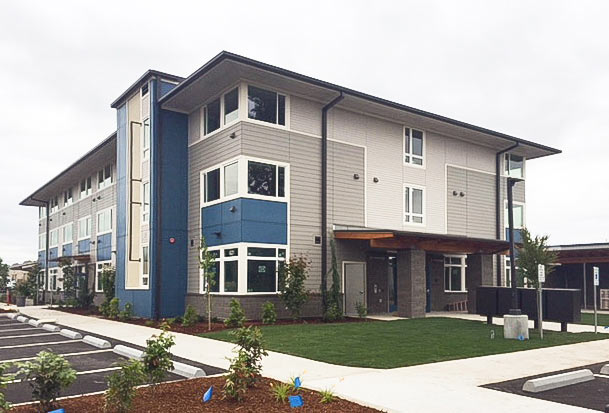
During a Feb. 3 Vancouver City Council meeting, council members approved, as a part of the consent agenda, authorization of the city manager to execute the Affordable Housing Funding contract with Housing Initiative to construct The Elwood project and approve any subsequent legal action necessary to enforce the terms of the same.
The Elwood is just one of several different measures that the city has been working on in order to provide affordable housing in the Vancouver area. According to a staff report presented during the Feb. 3 meeting, The Elwood, owned by the Housing Initiative, is located at 6317 NE Fourth Plain Blvd., in Vancouver. The project consists of four buildings with three stories and a total of 46 units. Of the 46 units, 50% are designated for people who are homeless and need behavioral health services.
Last February, city council members approved the use of $850,000 of Affordable Housing Funds to provide funds to the Vancouver Housing Authority (VHA) to assist with the costs of constructing The Elwood project. The Housing Initiative will use city AHF funds along with federal tax credits, county behavioral health funding and a loan to construct the project.
According to the report, The Elwood is the first affordable housing development to utilize recent changes to city zoning standards that no longer require ground floor retail uses for affordable housing developments on commercially zoned land near major transit corridors. Construction is anticipated to begin this month.
The city of Vancouver’s website lists several housing tools, programs and initiatives that city officials have been utilizing in order to continue to work on making housing more affordable in Vancouver and Clark County. These include:
- Affordable Housing Fund – “Vancouver voters approved a November 2016 ballot measure creating a $42 million Affordable Housing Fund serving families and individuals earning up to 50% of area median income,” according to the city’s website. “Thanks to the support of the community, the city has been able to use this resource to serve hundreds of low-income households in Vancouver to date. Current Affordable Housing Fund projects are creating and preserving affordable housing units, helping to prevent homelessness through rental assistance and services, and improving area shelters to increase safety and livability.”
- Community Development Block Grant (CDBG) and HOME Investment Partnerships Program – “The city of Vancouver uses federal CDBG and HOME funds to support the housing efforts of community organizations,” according to the city’s website. “These resources are used to develop and preserve affordable units, provide rental and utility assistance, offer services to help people find and maintain housing, and make needed home repairs for low-income homeowners. CDBG and HOME funds are awarded to community projects through an annual application process.”
- Multi-family Tax Exemption Program – “The city of Vancouver provides an opportunity for developers to assist in meeting housing needs in two specific areas of the city: Vancouver City Center and the Fourth Plain Corridor,” according to the city’s website. “The Multi-family Tax Exemption (MFTE) Program allows for an eight, 10 or 12-year tax exemption on the approved value of newly constructed or rehabilitated residential units. Eligible projects must make at least 20% of the units affordable to households at 100%, 80% or 60% of area median income, or offer other public benefits.”
- Impact Fee Waivers – “The city of Vancouver may approve a waiver of up to 80% of park and traffic impact fees for housing affordable to households at 80% AMI or below,” according to the city’s website. “Waived units must remain affordable in perpetuity. A waiver of school impact fees may also be provided, subject to approval by the school district. Interested developers may request an impact fee waiver application through the city’s permit center.”
- Accessory Dwelling Units (ADUs) – “Accessory Dwelling Units (ADUs) are small additional residential units on existing properties,” according to the city’s website. “ADUs have the potential to create flexible living space for households, allow seniors to age in place, and add to the rental housing stock. In August 2017, City Council approved changes to provide more flexibility for homeowners interested in developing an ADU.”





